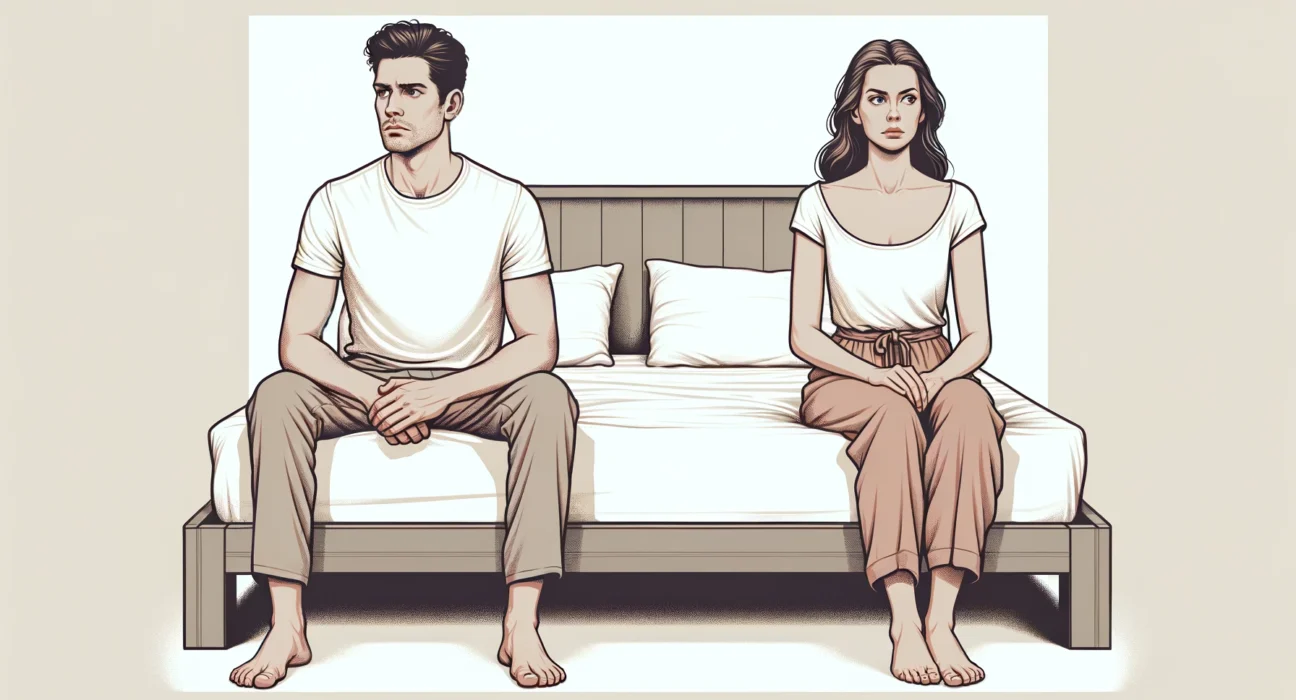Have you ever been in a situation where your husband doesn’t seem involved in being close or intimate with you?
It could make you’re feeling confused, hurt, and possibly even slightly scared about what it means to your relationship.
But it’s vital to do not forget that this doesn’t mechanically mean he doesn’t love you or find you attractive anymore.
There are numerous explanation why this is likely to be happening, and understanding them can enable you to work out what to do next.
First off, know that you just’re not alone. Many couples undergo periods where their physical connection isn’t as strong because it was once.
This might be due to stress, health issues, emotional distance, and even just the day by day routine getting in the best way.
It’s not at all times easy to discuss these items, but opening up about the way you’re feeling is a fantastic first step.
This article will dive into some common explanation why your husband is likely to be pulling away sexually and what you possibly can do about it.
1. Stress and External Pressures
When your husband turns away from you sexually, one possible explanation might be the load of stress and external pressures.
Picture him juggling work deadlines, financial worries, or family issues. These burdens can act like an invisible barrier, diminishing his sexual desire.
Recognizing this could be tricky, but when he’s more irritable, distant, or consistently preoccupied together with his phone or laptop, stress is likely to be the offender.
Additionally, consider how he unwinds after an extended day.
If there’s a drastic shift towards solo activities or he appears to be perpetually exhausted, these might be signs that the stressors of his day by day life are affecting him more deeply than anticipated.
Often, the relentless pace of responsibilities can result in a major decrease in libido, making sexual rejection more about in search of solace in solitude moderately than a mirrored image on the connection.
2. Self-Esteem and Body Image Issues
Self-perception plays a monumental role in a single’s sexual confidence.
If your husband is rejecting you sexually, it would stem from his own battles with self-esteem or body image.
This is a fragile area, as these issues are deeply personal and infrequently kept under wraps.
An indicator might be a change in how he talks about himself or his body, possibly he’s making more negative comments or showing reluctance to be seen without clothes.
Observe his behavior towards physical activities or social events.
A sudden withdrawal from these, or an increased sensitivity to comments about appearance, can signal struggles with self-image.
Men, identical to anyone else, can feel the pressure to fulfill certain societal standards of attractiveness.
When they feel they don’t measure up, it might probably seriously dampen their desire for intimacy, resulting in sexual rejection.
[Related: 12 Common Reasons Married Couples Grow Apart]
3. Relationship Dynamics
The state of your relationship itself can influence sexual desire.
When there’s tension, unresolved conflicts, or an absence of emotional connection, it might probably manifest as sexual rejection.
This doesn’t mean love has faded but indicates that emotional intimacy needs attention.
Recognizing this involves reflecting on the standard of your interactions. Are conversations more about logistics than love? Is there more silence than laughter?
Another aspect to observe for is the way you each manage disagreements.
If arguments are left unresolved or if there’s a pattern of avoiding tough conversations, these might be indicators that the emotional foundation of the connection is on shaky ground.
When emotional intimacy is compromised, physical intimacy often follows suit. Thus, sexual rejection on this context is likely to be a symptom of needing to rebuild emotional connections.
4. Health Concerns and Medication Side Effects
Sometimes, the guts is willing however the body isn’t. Health issues or the uncomfortable side effects of medicines can take a toll on one’s sex drive.
Picture your husband coping with chronic pain, diabetes, and even something as common as hypertension.
These conditions can directly impact his desire and skill to have interaction in sexual activities.
Spotting this cause might involve noticing more doctor visits or a change in physical vitality.
Medications for a wide range of conditions, like antidepressants or blood pressure pills, include uncomfortable side effects, and a decreased libido is commonly amongst them.
Pay attention to changes that coincide with starting latest medications or altering dosages.
He won’t connect the dots between his health treatment and his sexual disinterest, making it a sensitive topic to approach.
(*10*)5. Fear of Performance Failure
Worrying about sexual performance can create a self-fulfilling prophecy where the fear of not performing well results in avoidance of sexual encounters altogether.
You might notice him being hesitant or making excuses when the chance for intimacy arises.
This anxiety can stem from past experiences or societal pressures to “perform” a certain way.
Men often struggle in silence with these fears, as societal norms discourage them from expressing vulnerabilities.
Look for signs of tension or avoidance behaviors related to intimate moments.
This nervousness could be subtle, like changing the topic when intimacy comes up or showing unease during romantic situations.
6. Changes in Attraction
Over time, people change, and so do their preferences and attractions.
Facing the likelihood that your husband’s attraction towards you may have evolved could be tough.
He might still deeply love and cherish you but struggles with physical attraction, which is complex and influenced by quite a few aspects beyond physical appearance.
Detecting this involves observing how he interacts with you beyond the bedroom. Does he still compliment you or show affection in non-sexual ways?
A decrease or shift in these behaviors can hint at changes in attraction. Remember, attraction is multi-faceted, encompassing emotional, mental, and physical elements.
7. Lack of Novelty and Routine Fatigue
The excitement of novelty wears off in long-term relationships, potentially resulting in a sexual rut.
When day by day looks like a repeat of the last, it’s easy for sexual encounters to feel more like a routine than a passionate pursuit.
Spotting this scenario often involves a realization that surprises or spontaneous romantic gestures have turn out to be rare.
Watch for a pattern of selecting comfort (like watching TV in pajamas) over opportunities for intimacy.
While there’s nothing unsuitable with comfort, the absence of latest experiences can diminish sexual desire.
Keep an eye fixed out for conversations that revolve more around chores than plans for brand spanking new adventures together.
8. He Could Be Cheating
The thought that a partner is likely to be in search of intimacy elsewhere is a tricky pill to swallow.
Signs of infidelity aren’t at all times about lipstick on the collar; they could be subtle, like sudden changes in schedule or unexplained absences.
You might notice him guarding his phone more closely or being evasive about his whereabouts.
While these behaviors don’t guarantee he’s cheating, they will indicate something’s off.
Cheating impacts intimacy inside a relationship, as guilt or emotional attachment to a different person makes it difficult to keep up the identical level of physical closeness at home.
Pay attention to shifts in how he communicates or shows affection.
A decrease in openness and increased secrecy could be red flags, signaling a divide that goes beyond the physical aspect of your relationship.
9. Growing Apart
Relationships evolve, and sometimes, partners grow in several directions.
You might find that the interests, values, or goals that when united you now not do.
Catching this drift early involves noticing when conversations about future plans or dreams don’t align like they used to.
Maybe there’s more silence at dinner than discussion, or you discover yourselves having fun with hobbies alone moderately than together.
Feeling more like roommates than romantic partners is a robust indicator of growing apart.
When the spark of shared excitement and mutual growth dims, it might probably naturally result in a decrease in sexual desire.
Observing an absence of enthusiasm for shared activities or projects can point to this growing gap in your relationship.
10. Underlying Resentment
Harboring unspoken grievances can create a barrier to intimacy.
Resentment might stem from past arguments, perceived inequalities in the connection, or unmet emotional needs.
You might notice passive-aggressive behavior or reluctance to have interaction in meaningful conversation.
These are signs that there’s more under the surface affecting his desire to attach sexually.
Resentment often builds quietly, making it hard to identify until it’s deeply rooted. A sudden or gradual decrease in affectionate touch or kindness can indicate lingering upset.
Keeping an eye fixed out for signs of annoyance or indifference in situations that used to spark joy or laughter can assist in identifying underlying resentment.
What To Do When You Husband Rejects You Sexually (6 Tips)
1. Communicate Openly and Without Blame
Talking things out can sometimes feel like opening a can of worms, but it surely’s crucial.
Approach your husband with care and honesty, expressing how you’re feeling without pointing fingers. It’s not about accusing him of failing you but sharing your feelings and in search of to grasp his perspective. Keeping the conversation blame-free makes it easier for him to open up.
Remember, timing is all the pieces. Choose a moment if you each are relaxed and never distracted by other responsibilities.
This isn’t a chat to squeeze in between checking emails and cooking dinner. By making a protected space for dialogue, you encourage honesty and vulnerability from either side.
2. Focus on Emotional Intimacy
Building a bridge back to physical intimacy often starts with emotional connection.
Spend quality time together doing activities you each enjoy, whether it’s a quiet evening walk or binge-watching your favorite series.
These moments can reignite the spark of closeness, making it easier to transition to discussions of physical intimacy.
Emotional intimacy also means being present. In our world filled with distractions, truly listening and fascinating along with your partner is a present.
Show interest in his day, his thoughts, and his feelings.
This sort of attention fosters a deep sense of connection that may naturally result in an improvement in your physical relationship.
3. Seek Professional Help
Sometimes, the most effective move is to call within the reinforcements.
Seeing a couples therapist or a sex therapist can offer you the tools and insights needed to navigate through this challenge.
Professionals offer a neutral perspective and might guide the conversation in productive ways you may not have considered.
Don’t view therapy as a final resort or an indication of failure. Think of it as enrolling in a master class to your relationship.
You’re each learning tips on how to communicate higher, understand one another’s needs, and reconnect on a deeper level. It’s about growth, not blame.
4. Cultivate Your Own Self-Confidence
Feeling rejected can take a toll in your self-esteem, but it surely’s vital to do not forget that you’re worthy of affection and desire.
Engage in activities that make you’re feeling good about yourself, whether it’s a hobby, exercise, or just pampering yourself.
When you’re confident and completely happy inside yourself, it radiates outward and might positively impact your relationship.
This isn’t about changing yourself to be more desirable but about nurturing your well-being.
A powerful sense of self could make you more resilient to relationship challenges. Plus, confidence is attractive. It might just spark a renewed interest out of your husband.
5. Create a Stress-Free Environment
If stress and day by day pressures are dampening your husband’s sexual desire, work together to create a more relaxing home environment.
This could mean delegating tasks more evenly, setting aside quiet time to destress, and even planning regular date nights to interrupt the monotony of on a regular basis life.
Remember, leisure is personal. What soothes one person won’t work for one more.
Discover what helps your husband unwind. Maybe it’s a weekend away from the youngsters, a quiet evening with a book, or a hobby that he’s been wanting to pursue.
Reducing stress levels can result in improvements in all areas of your relationship, including the bedroom.
6. Be Patient
Rebuilding sexual intimacy doesn’t occur overnight. It’s a journey, with ups and downs.
Showing patience and understanding towards your husband during this time can strengthen your bond.
Celebrate small victories and maintain a positive outlook. This situation doesn’t define your marriage; it’s only a chapter that you just’re navigating together.
Your patience also demonstrates to your husband that you just’re committed to the connection for the long haul, not only for the physical elements.
This reassurance could be incredibly comforting and might encourage him to open up more, work on issues together, and step by step rekindle the physical intimacy.
[Related: 12 Things That Happen When Couples Stop Spending Quality Time Together]




















